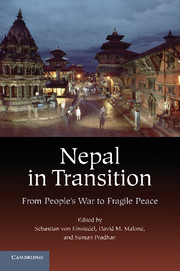Book contents
- Frontmatter
- Contents
- Contributors
- Acknowledgments
- 1 Introduction
- The Context
- Critical Transition and the Role of Outsiders
- 6 Nepal's Masala Peacemaking
- 7 A Comprehensive Peace? Lessons from Human Rights Monitoring in Nepal
- 8 The United Nations and Support to Nepal's Peace Process: The Role of the UN Mission in Nepal
- 9 The 2008 Constituent Assembly Election: Social Inclusion for Peace
- 10 Revolution by Other Means: The Transformation of Nepal's Maoists in a Time of Peace
- Regional Dynamics
- Conclusions
- Index
- References
8 - The United Nations and Support to Nepal's Peace Process: The Role of the UN Mission in Nepal
Published online by Cambridge University Press: 05 April 2012
- Frontmatter
- Contents
- Contributors
- Acknowledgments
- 1 Introduction
- The Context
- Critical Transition and the Role of Outsiders
- 6 Nepal's Masala Peacemaking
- 7 A Comprehensive Peace? Lessons from Human Rights Monitoring in Nepal
- 8 The United Nations and Support to Nepal's Peace Process: The Role of the UN Mission in Nepal
- 9 The 2008 Constituent Assembly Election: Social Inclusion for Peace
- 10 Revolution by Other Means: The Transformation of Nepal's Maoists in a Time of Peace
- Regional Dynamics
- Conclusions
- Index
- References
Summary
Nepal's peace process has been exceptional in the extent to which it was a truly national achievement and not one mediated by any international actor. The United Nations Mission in Nepal (UNMIN) too has been unusual among recent UN peace operations, which increasingly have had wide-ranging mandates, in the limited focus of its support, and among UN missions with a military function, in the lightness of its military component. This chapter explains how this mandate and mission configuration – negotiated between the expectations of the parties and the capacities of the UN – came about. It describes the work of UNMIN in monitoring the commitments of the peace agreements regarding the armies and their weapons and in assisting the country on its troubled path toward the election of a Constituent Assembly. It explains how the breakdown of cooperation among the parties after the election success of the Maoists delayed decisions about the future of the combatants and the nature of a federal constitution for the new republic. It concludes by considering the flaws in Nepal's peace process and the strengths and weaknesses of an unusual UN mission in this context, particularly the tensions UNMIN faced between a limited mandate and high expectations, as well as its inability to determine its exit strategy when it depended on decisions that it was largely excluded from assisting.
The End of the War
The decision of the political leaders who shaped the peace process to request a significant UN role grew out of a longer period of mostly low-profile political engagement followed by a shorter period of high-profile human rights monitoring.
- Type
- Chapter
- Information
- Nepal in TransitionFrom People's War to Fragile Peace, pp. 201 - 231Publisher: Cambridge University PressPrint publication year: 2012
References
- 10
- Cited by



